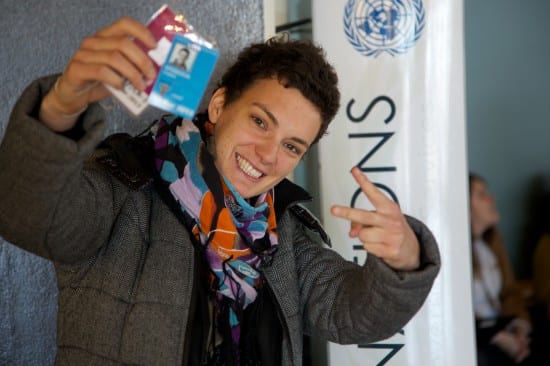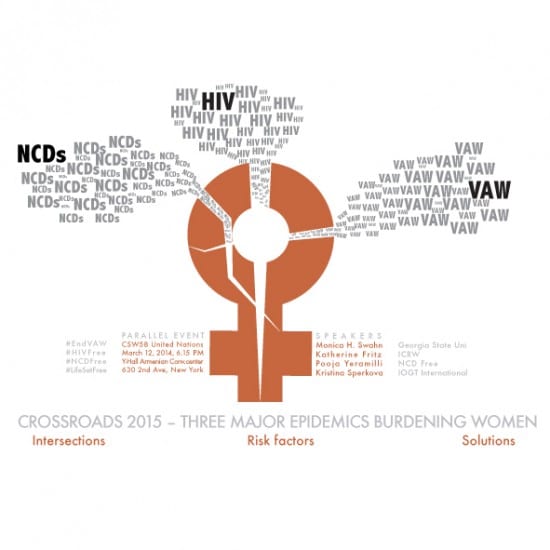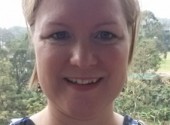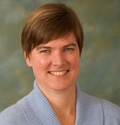Last year was our first time ever to attend the United Nations Commission on the Status of Women in New York. You could follow much of what we did there through Maik’s and my own blogs and via the social media. One of the highlights at CSW57 surely had to be: our Parallel Event called “The Disregarded Factor Behind Gender-Based Violence“.
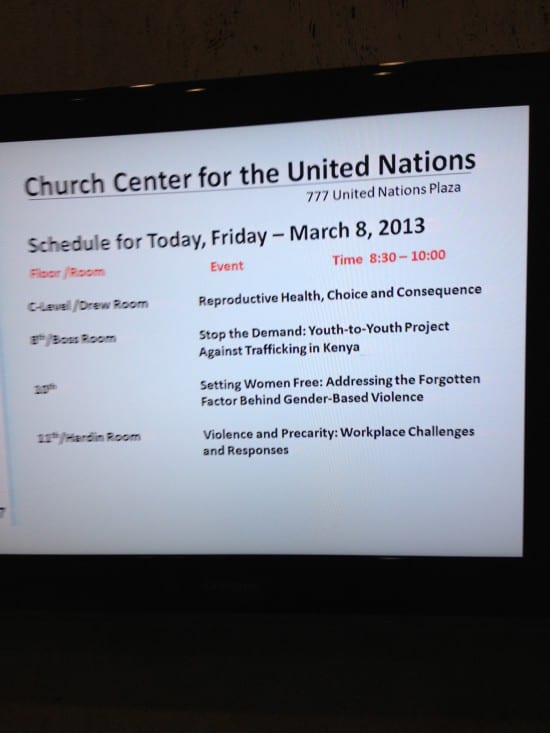
Annoucement of our parallel event. “Setting Women Free Addressing The Forgotten Factor Behind Gender-Based”Violence
This year, we’ll again participate in the Commission on the Status of Women (CSW58) and we’ll make even bigger efforts to keep you updated about the different happenings there. One thing is for sure this time around: we will hold another Parallel Event and it will truly be awesome. I am convinced that the theme for our Parallel Event this year is truly groundbreaking. And we bring together leading experts in their respective fields.
The Priority Theme for the 2014 Commission on the Status of Women (CSW58) is: “Challenges and achievements in the implementation of the Millennium Development Goals for women and girls”
We wanted to use this opportunity to bring together the three major issues that are burdening women and girls today, and that all demand special focus within the development agenda and the post-2015 process:
- Non-communicable diseases (NCDs) are the leading cause of death and disability worldwide. And they “… are the single biggest threat to female health and development.”
- HIV/ Aids continues to be a tremendous obstacle to development, entrenching people in poverty (though major accomplishments have been made). In sub-Saharan Africa, for instance, women constitute 60% of people living with HIV. Africa accounts for only one tenth of the world’s population but nine out of ten new cases of HIV infection. Eighty three percent of all AIDS deaths are in Africa, where the disease has killed ten times more people than war.
Gender inequalities are a key driver of the epidemic in several ways: Violence against women (physical, sexual and emotional), which is experienced by 10 to 60% of women (ages 15-49 years) worldwide, increases their vulnerability to HIV.
- Physical or sexual violence is a public health problem that affects more than one third of all women globally. “These findings send a powerful message that violence against women is a global health problem of epidemic proportions,” said Dr Margaret Chan, Director-General, WHO.
http://www.youtube.com/watch?v=Mn53k5CLY58
In short, this is the background for our event. And this is what will happen at our event:
Women in the 21st century are potentially the biggest, most powerful drivers for development and global prosperity. But as a group they are also – still – subjected to tremendous inequalities, health threats and extreme poverty.
Three epidemics largely make up the burden on women and girls, their human rights and opportunities to be equal and free: all forms of violence against women, HIV/ Aids and non-communicable diseases.
With the backdrop of CSW58 priority theme “Challenges and achievements in the implementation of the Millennium Development Goals for women and girls, this parallel event” seeks to address these three epidemics as the major challenges and to consequently explore solutions and synergies of measures to alleviate the burden on women and girls of each of the epidemics.
One in three women will be subjected to gender-based violence during her lifetime.
Evidence shows that very often violence against women contributes to the HIV/ Aids epidemic, for example through rape. HIV/ Aids affects, like NCDs and VAW, all generations of females: from the unborn and newly born, via children and youth, to adults and grand mothers.
Non-communicable diseases are today the leading cause of death and disability and thus a major obstacle to development in the world. They are a catalyst of poverty and keep families, communities and societies locked in the vicious circle of poverty – and they affect women disproportionately. NCDs are the single biggest threat to female health and development today.
Given this evidence and the fact that almost never have these three issues been addressed together – our parallel event attempts this innovative approach. But not only is the topic innovative, so are the methods employed in our parallel event: combining expert know-how of the leading researchers in each field, with NGO savvy concerning grass-roots actions for change, offering participatory and interactive approaches that foster dialogue and allow for the audience to not only ask questions but be an active part of the joint effort to built knowledge together, beyond the borders of each of the issues and to explore together measures with synergy to promote change.
The purpose is to explore what can be done – on all levels, from grass-roots activism, to research and advocacy on political level – that benefits change within all three of the major issues impacting women and girls today.
To accomplish this and provide participants with inspiration and concrete tools to take with them, we follow a 6-step structure:
- Introduction of parallel event, the experts and the overall concept
- An exploration of the issue: NCDs, women and development
- An exploration of the issue: HIV/ Aids, gender-based violence and women’s rights
- An exploration of the issue: Violence against Women and Girls (VAW) as obstacle to development
- A summary of the common risk factors and synergies for change, including an analysis of landmark publications of each field, like the UN high-level report on MDGs.
- A panel discussion driven by the seminar participants, their input and questions; we start by showing two videos to illustrate what can be by NGOs on grass-roots level and will explore how those measures can bring about global change.
We have a line-up of amazing speakers and experts for this event:
Monica H. Swahn, Ph.D. who is Associate Vice President for Research and Professor, Public Health at Georgia State University.
Katherine Fritz, PhD, MPH, who is Director, Global Health at the International Center for Research on Women (ICRW).
Pooja Yerramilli, of the NCD Free Team, who is (among other things) Collaborator at Harvard Global Equity Initiative.
Myself, I will be the moderator. I’ll take a look at what NGOs can do concretely in their communities and will moderate the discussion to explore synergies together with the participants in addressing these three major epidemics.
I am so much looking forward and can’t wait to get to New York! I hope to see you there and if not I’ll be happy to take up your comments, questions and ideas via social media.
—
More information:
Poster for the event, with the link to register for participation: CSW58 IOGT Event
